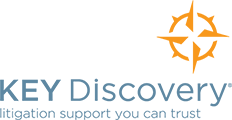Whether your law firm employs five or 500, the decision to outsource your discovery needs or bring it in house requires serious consideration. Ask yourself these five key questions:
- Do we have the right staff to manage all our discovery in house?
- Is discovery taking people away from other critical tasks?
- Will we need additional resources and at what cost?
- What are the technology requirements and what is the time and monetary investment to get up-to-speed and stay current?
- What are the implications if we do it wrong?
If you feel equipped to tackle your discovery needs yourself, we wish you nothing but the best. If you are unsure about the best solution for your business and are weighing the pros and cons, we’d like to provide you with some food for thought. Remember, there are many aspects to discovery including paper scanning, legal hold, collection, early case assessment, data processing, hosting, and production and you can outsource some or all of it.
Cost
Unless you have a money tree growing in your lobby (and if you do, please send us a seed), cost is most likely your biggest consideration on whether or not to bring your discovery needs in house.
If you’re thinking, “we’ll just hire one of those young whippersnappers straight out of college to do it because (s)he must have taken a course or two on it,” think again. According to an August 2019 article published in Legaltech News, author Victoria Hudgins notes, “most U.S. law schools aren’t providing e-discovery courses to prepare new lawyers for the potential work of examining and preserving electronic data.” Uh oh, now what?
Perhaps you’re considering your IT guy Bob for the job. He’s techy, he can fix your computer, and seems to know his way around a keyboard. Let me ask you this: would you hire your veterinarian to conduct your gastroplasty? All degrees are not created equal. Discovery requires a specialist, not a general surgeon.
While you balance the cost side of this issue, we’ve included a few nuggets below for you to munch on:
- Is your staff trained in the nuances of discovery and, if not, what is the cost to obtain the training your staff will need to reach expert status (don’t forget that technology moves fast, and training will be ongoing)?
- What are your lawyers and paralegals losing in billable hours if they are spending 70 percent of their time on discovery?
- Does your staff have the experience and knowledge of past cases to narrow down the files that need to be examined and identify the ones that are crucial to your case?
- What is the cost of purchasing the required software and the time investment for training?
Cybersecurity
Client confidentiality is a mainstay in the law profession. By bringing the eDiscovery process in-house, you are holding every piece of confidential client data in your proverbial hand. In this hand you also hold the risk of a cybersecurity breach, user error, or the misuse of confidential client information.
Should you decide to take on eDiscovery internally, you will need to build a brick house that the biggest, meanest wolf cannot blow down. You will need to ensure that your eDiscovery software has current security certifications to protect you against hackers, and those nasty client technology audits.
Chain of Custody
Maintaining defensive chain of custody procedures and documentation takes experience, time, and attention to detail. This an important part of the job for discovery firms and data collections specialists and, if done incorrectly, can be very costly to both your wallet and reputation. If you decide to handle your own discovery, you must have a concrete process in place as to who collects, manages, and accesses all case information.
The bottom line is this: whether you outsource your discovery work or decide to do it yourself, do your homework. Investigate the various litigation support firms specializing in all aspects of discovery, such as KEY Discovery. We also recommend you stay abreast of changes taking place on the discovery front. The American Bar Association eDiscovery Resources pages are a great place to start.
